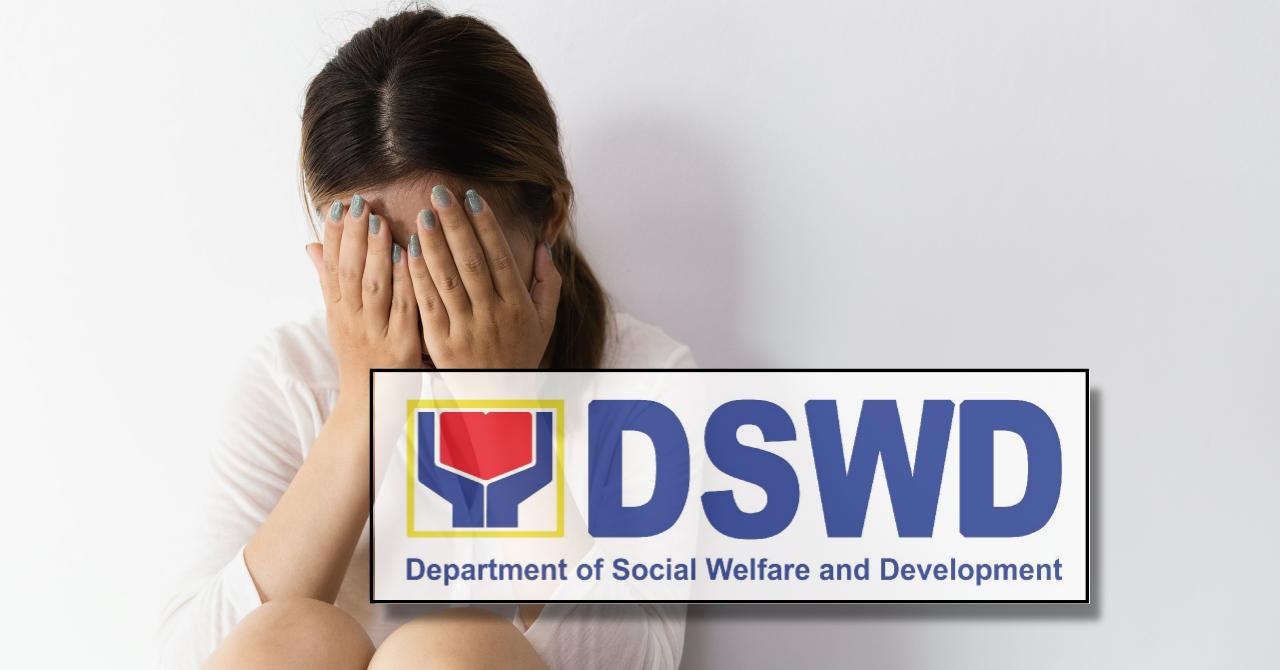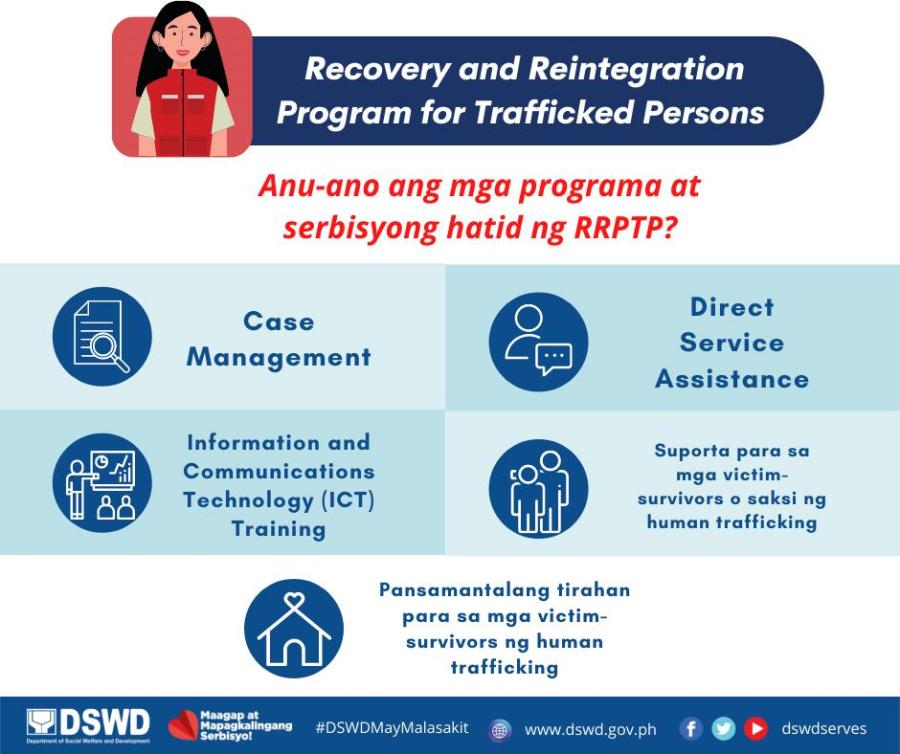Did you know that the Department of Social Welfare and Development (DSWD) has a program for victims of human trafficking? As a matter of fact, in 2021, this program had assisted more than 1,800 human trafficking victims, in coordination with DSWD Field Offices, non-government organizations (NGOs), and other partner organizations.
In this article, we will talk all about the DSWD’s Recovery and Reintegration Program for Trafficked Persons (RRPTP). In particular, we will be discussing the different types of services offered by the program, as well as the steps involved in providing these services.

What is Human Trafficking?
Before anything else, let us discuss what “human trafficking” means. The DSWD defines it in terms of the acts, methods, and purposes involved:
Acts. The act of trafficking may involve the recruitment, hiring, obtaining, transportation, transferring, and/or harboring of persons — with or without their consent — within or across national borders.
Methods. Typically, trafficking methods involve deception, abduction, threats, and/or use of force. It may also involve the abuse of power and taking advantage of a person’s vulnerability.
Purpose. People are usually trafficked for the purposes of forced labor, slavery, prostitution, and/or sexual exploitation. Meanwhile, some cases involve the illegal removal and sale of internal organs.
In addition to the above, when children are recruited, transported, or even adopted for the purpose of exploitation, this is also considered as human trafficking.
What is the Recovery and Reintegration Program for Trafficked Persons?
As the name says, this DSWD program involves both recovery and reintegration. It uses a multi-sectoral approach that provides psychosocial, social, and economic support to human trafficking victims. This way, they can heal and recover from trauma, and eventually rebuild their lives with confidence.
At the same time, the RRPTP program also aims to support the victim’s family as well as the community where he/she will be reintegrated. By doing so, other family and community members can be prevented from becoming victims of trafficking.
Target Beneficiaries of the Program
The RRPTP program is open to all Filipinos who are victims of trafficking. In particular, it caters to:
- Victims who have been trafficked within the Philippines and abroad;
- Victims who are currently residing in the Philippines or have been repatriated to the Philippines;
- Minors who have been trafficked and require rehabilitative services;
- Adults who have been trafficked and are willing to participate in the program;
- Elderly persons who have been trafficked and require protective services;
- Persons with disabilities who have been trafficked and require special protection services;
- Families and relatives of human trafficking victims;
- Communities with a high incidence of trafficking; and
- Foreign nationals who have been victims of trafficking in the Philippines.
NOTE: Victims must be willing to cooperate with law enforcement authorities, especially during the investigation and prosecution of traffickers. They must also be willing to participate in the rehabilitation activities of the program.
Types of Services Offered by the Program
The services offered by the RRPTP program include direct services, auxiliary services, and other services, as follows;
Direct Services
- Case Management;
- Rescue and Repatriation;
- Legal Services;
- Financial Assistance (i.e. for employment, skills training, etc.);
- Capital Assistance; and
- Referral to Employers and/or Business Partners.
Auxiliary Services
- Temporary Shelter;
- Documentation;
- Psychosocial Counseling; and
- Other Incidental Expenses.
Other Services
- Transportation Assistance;
- Medical Assistance;
- Educational Assistance;
- Livelihood Assistance; and
- Hygiene Kits and Food Packs.
Aside from the above services, all DSWD Field Offices are required to have a 24-hour Trafficking in Persons (TIP) Helpline. They should also have a focal person who is assigned to receive the calls made through the helpline.
Documentary Requirements
To avail of the RRPTP program and its services, victims of human trafficking need to prepare the following documentary requirements:
- Passport or Valid ID;
- Birth Certificate (for minors);
- Barangay Clearance or Certificate of Indigency; and
- Referral Letter (if applicable).
Aside from these, additional documents may also be required. For instance, if the victim came from abroad, he/she needs to present other necessary travel documents. Likewise, a Medical Certificate may be obtained to assess the victim’s physical and psychological condition. Furthermore, if educational assistance will be given, then a Certificate of Enrollment should also be submitted.
Steps Involved in the Program
To apply for the RRPTP program, victims should go to the nearest DSWD Field Office. They can also seek assistance from any NGO or agency that offers help to victims of human trafficking. Either way, they will be assessed based on their situation. This assessment will help determine the type(s) of service(s) that they need.
Upon getting the assistance they need, victims can look forward to rebuilding their lives. What’s more, since the program is confidential, they can rest assured that their privacy will be respected.
Video: DSWD’s “Iligtas Mo Ako” Campaign
Check out the following video, which features the “Iligtas Mo Ako” campaign of DSWD. This campaign includes a series of videos that aim to help raise awareness about cases of human trafficking in the Philippines and abroad:
Frequently Asked Questions
Meanwhile, here are some commonly asked questions and answers about DSWD’s RRPTP program:
1. What is the Recovery and Reintegration Program for Trafficked Persons?
The “Recovery and Reintegration Program for Trafficked Persons” (RRPTP) is a comprehensive program of the DSWD. It aims to help victims of human trafficking by providing services throughout their recovery and reintegration. The main goal is to help them and their families rebuild their lives, while making sure that their communities are also safe against the dangers of human trafficking.
2. Who are the target beneficiaries of the program?
The RRPTP program is open to all Filipinos who are victims of trafficking, including those who: (a) have been trafficked within the Philippines and abroad; (b) are residing in the Philippines or have been repatriated to the Philippines: (c) are minors, adults, elderly persons, or persons with disabilities who have been trafficked; (d) are families and relatives of human trafficking victims; (e) communities with a high incidence of trafficking; and (f) are foreign nationals who have been victims of trafficking in the Philippines.
3. What are the services offered by the program?
The RRPTP program provides different types of services, depending on each case. Direct services include rescue and repatriation (for Filipinos abroad), legal services, financial assistance, capital assistance, and referral to employers and/or business partners. There are also auxiliary services like temporary shelter, documentation, and psychosocial counseling. Furthermore, the program includes other services such as transportation assistance, medical assistance, educational assistance, and livelihood assistance, plus hygiene kits and food packs for victims and their families.
4. What are the documentary requirements?
To avail of the programs and services of the RRPTP program, victims of human trafficking need to prepare a Passport or Valid ID, Birth Certificate (for minors), Barangay Clearance or Certificate of Indigency, and a Referral Letter (if applicable). Depending on the case, additional documents may be required, such as travel documents (for those coming from abroad), a Medical Certificate, and Certificate of Enrollment (for those who will be given educational assistance).
5. What are the steps involved in the program?
To apply for the RRPTP program and its services, victims of human trafficking are encouraged to go to the nearest DSWD Field Office, or any NGO or agency that provides help to trafficking victims. In these places, their situations will be assessed, in order to help determine the types of services that they need.
Infographic About the Program
Here is an infographic presenting the different programs and services offered by the RRPTP program of DSWD:

Contact Information: DSWD Central Office
If you are based in the National Capital Region (NCR) and you would like to learn more about the RRPTP program, you can get in touch with the DSWD Central Office through the following contact details:
Address: DSWD Central Office, Batasang Pambansa Complex, Constitution Hills, Quezon City, Philippines, 1126
Telephone: (02) 8931 8101 to 07 local 407, 408, and 409 / (02) 8931 9141 (RRPTP hotline)
Email: pmb@dswd.gov.ph
Website: https://www.dswd.gov.ph/
Facebook: https://www.facebook.com/dswdserves/
NOTE: Other than the DSWD Central Office in Quezon City, you can also contact the department’s Field Offices, which are located across the country. Here is the link to the directory of DSWD Field Offices, including the telephone number and website of each office.
Google Map Location
Below is the location of the DSWD Central Office on Google Maps, for your reference:
Summary
We’ve all heard tragic stories of human trafficking, of people getting abused — physically and/or psychologically — both inside and outside the Philippines. We also know that regardless of age, gender, or nationality, human trafficking is a serious threat against people’s safety and well-being. Hence, together let us all fight against human trafficking. Let us not hesitate to report cases of abuse, exploitation, and other similar cases to the DSWD and other authorities.
DISCLAIMER: We hope that the above guide has been helpful, especially if you or anyone you know is a victim of human trafficking and needs urgent help. Please note that the above guide is presented for general, information-sharing purposes only. To know more about the RRPTP program, including the services, requirements, and steps involved, please visit the official website and Facebook page of DSWD.
READ NEXT: How to Avoid Becoming a Victim of Illegal Recruitment